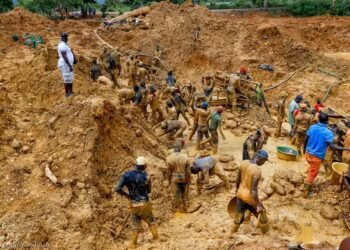Ghana, renowned for its position as one of the world’s leading exporters of cocoa, is facing a critical threat to its standing, according to a Fair Trade report.
The document cautioned that without prompt action to address encroachment issues by real estate developers, Ghana may relinquish its coveted position to neighboring countries. The President of the Fair Trade Ghana Network, Florence Blankson, emphasized the urgent need for the government to tackle deforestation, illegal mining, and encroachment on cocoa farmlands, highlighting the potential consequences for cocoa farmers and the nation’s global export status.
Speaking at the 6th Annual General Meeting of Fair Trade Ghana Network, Florence Blankson expressed concern about the looming challenges facing Ghana’s cocoa sector. Deforestation, often driven by illegal mining activities, poses a significant threat to cocoa farmers.
Blankson urged the government to take more proactive measures in addressing these issues to ensure the sustainability of the cocoa industry. She criticized the perceived ineffectiveness of government agencies in engaging with stakeholders within the sector, emphasizing the urgency of decisive action.
A major concern highlighted in the Fair Trade report is the encroachment on cocoa farmlands by real estate developers. Blankson warned that if not promptly addressed, this encroachment could lead to Ghana losing its esteemed position as a global cocoa exporter.
The competition for land between cocoa farming and real estate development is intensifying, jeopardizing the livelihoods of cocoa farmers and the country’s vital cocoa export industry.
The Threat of Galamsey and Deforestation
Blankson pointed out two significant threats to Ghana’s cocoa sector: illegal mining, known as “galamsey,” and deforestation. These activities not only harm the environment but also directly impact cocoa cultivation. The President of Fair Trade Ghana Network stressed the need for a comprehensive approach to combat these threats, emphasizing that a failure to do so could result in severe consequences for the nation’s cocoa export capabilities.
During her address, Blankson expressed dismay at the state of water bodies, likening them to tea due to pollution from illegal mining activities. This alarming observation underscores the environmental impact of irresponsible practices in the cocoa sector. Blankson’s concern about the condition of water bodies serves as a stark reminder of the broader consequences of neglecting sustainable practices in cocoa cultivation.
According to Statista, the export value of cocoa beans and cocoa products from Ghana experienced a notable decrease of 19.0% in 2022 compared to the previous year, amounting to about $2.3 billion. Despite achieving the highest export value in 2021 at approximately $2.84 billion, the declining trend raises concerns about the long-term economic impact on Ghana’s cocoa industry. Cocoa remains a crucial commodity for the country, representing a substantial percentage of its overall exports.
Fair Trade Ghana Network, a membership-based organization dedicated to sustainable agriculture and handicraft production, plays a crucial role in advocating for fair trade practices in Ghana. The network, consisting of fair trade certified farmers, handicraft producers, and hired labor organizations, focuses on programs aimed at benefiting its members. In the face of the current threats to Ghana’s cocoa sector, the advocacy and initiatives of Fair Trade Ghana Network become even more pivotal in safeguarding the livelihoods of cocoa farmers and preserving the nation’s global standing as a major cocoa exporter.
The Fair Trade report serves as a stark warning for Ghana to address the pressing issues jeopardizing its position as a leading cocoa exporter. Urgent measures are needed to combat encroachment by real estate developers, illegal mining, and deforestation.
The collaborative efforts of the government, industry stakeholders, and organizations like Fair Trade Ghana Network are essential to secure the sustainability of the cocoa sector. As Ghana navigates these challenges, the global community watches closely, hoping that concerted actions will preserve the rich legacy of Ghana as a beacon in the world of cocoa production.
READ ALSO: Financial Losses: GITFiC Says Bank of Ghana Cannot Be Blamed



















